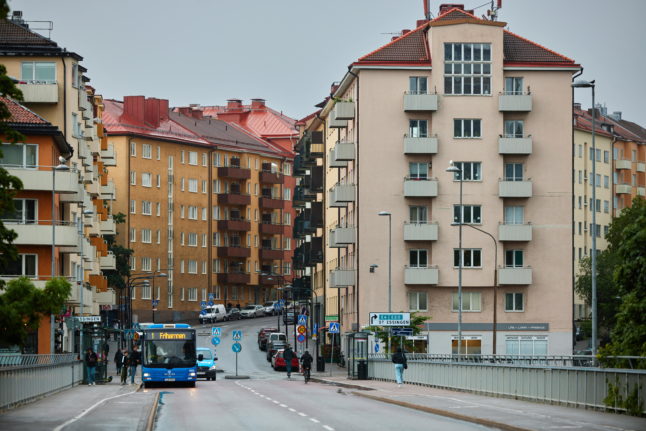"I had 13 different apartments in the first ten years I lived here," says Billy McCormac, the head of the Stockholm branch of the Swedish Property Federation (Fastighetsägarna).
"It got to a point where I thought 'Why put the stuff in the drawers any more, I may as well keep it in suitcase'," the US immigrant adds with a wry chuckle.
But the housing crisis is no laughing matter. In Stockholm, renters wait an average of 7.5 years for a "first-hand contract", while in the meantime enduring years living with fewer rights as a sub-letting tenant. The queues and housing shortages have fanned the flames of a thriving black market, on which house hunters pay large sums of cash to skip the official queues.
The situation is a particular headache for people trying to recruit talent from abroad to join their start-up companies. McCormac fears that it will be too tough for Stockholm to produce more companies like Spotify and Klarna if new workers can't find a place to call home.
One man who's no stranger to housing hell is Los Angeles-native Tyler Crowley, known by some as the "start-up whisperer". Crowley, who organizes networking events for tech-interested Stockholmers and has dubbed the city "the tech world's hidden nightclub", tells The Local that Stockholm risks its potential tech success due to the housing situation.
"Stockholm is like a party with a $500 coat check. It's shaping up to be the next super hot start-up centre. All the goods are here. We have the best drinks, the best DJ… we have it all, but if you're not able to participate then what good is it?" he said on Thursday.
Crowley’s personal experience of the Stockholm housing situation has left him in no doubt that Stockholm is in a class of its own in this regard.
"It's bad. It's stunningly bad. This might be the hardest city in the world to get an apartment," he says. "Someone should commission a report, I think they could actually prove it."
On Thursday morning, Billy McCormac hosted a seminar in central Stockholm tackling the issue. Armed with fresh research from the federation, a trade organization representing the interests of private property owners in Sweden, he interviewed a panel including a Stockholm city councillor, Crowley himself, and a young entrepreneur considering seeking greener pastures in Barcelona.
"When I read Enrico Moretti's The New Geography of Jobs it opened my eyes," McCormac explains. "The people in the first IT bubble said that geography doesn't mean anything – that you could work anywhere. Now its the opposite, geography means everything."
The problem, he says, is that politicians on a local and national level prefer to shun the issue rather than respond, preventing a start-up cluster that cities like Berlin and San Francisco are enjoying.
"We want to show that everyone wins when politics is more responsive. It should be 'what can we do for you to make life easier?'. We are seeing cities that are really quite good at that, like London, where their approach is 'Tell us what you want and we'll make it happen'."
But Stockholm politicians, two of whom were on the scene on Thursday, can't do much more than acknowledge the problem. McCormac said that both city councillor Ulla Hamilton and Maria Östberg Svanelid of the Social Democrats "could have been more emphatic" during the discussion, but he realizes that in election years it's often tough to expect much more than promises.
And with nothing more than promises, he fears that he will hear more tales of people who choose London, Berlin, or San Francisco over Stockholm due to the horror housing stories they've heard.
Tyler Crowley concurs, arguing that Stockholm has a "surprisingly lazy" approach to the tech scene in general, adding that other cities "would do anything" for the resources that Stockholm has in terms of talent.
"I'm obviously very biased, but to me technology is where the future is going. I am not alone with that idea … the prime minister of the UK agrees with that. Some world leaders agree. It's not a crazy idea that technology is where countries need to be focused going forward," he adds.
He says it would be "sad" if Stockholm didn't address the housing shortage and seize this opportunity, especially when other countries were striving so hard for what Stockholm already has.
“A million-people city is not that big. It shouldn't be that hard," he adds.




 Please whitelist us to continue reading.
Please whitelist us to continue reading.
Member comments